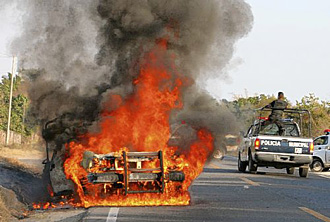
|  |  |  Travel & Outdoors | February 2009 Travel & Outdoors | February 2009  
Vacationers Shrug at Mexico Travel Alert
 Anya Sostek - Pittsburgh Post-Gazette Anya Sostek - Pittsburgh Post-Gazette
go to original


| | Police officers drive past a burning police vehicle Wednesday in Zihuatanejo, Mexico. Gunmen opened fire and hurled grenades at a patrol car in the Pacific resort town, killing four officers. (Felipe Salinas/Associated Press) |  |
Travelers to Mexico have long been on the lookout for dangers such as sunburn and Montezuma's revenge.

But the U.S. State Department and dozens of colleges are now warning vacationers - particularly students on spring break - of more sinister hazards lurking across the border.

A State Department travel alert issued last week called attention to increased drug-related violence in Mexico, especially along the U.S.-Mexico border.

More than 1,000 people have already been killed in drug violence in Mexico this year, the country's federal attorney general Eduardo Medina Mora told The Associated Press on Thursday. About 6,290 people were killed in 2008 - double the number killed in drug violence in 2007.

The alert does not advise travelers to stay away from Mexico entirely but recommends limiting travel to main roads during daylight hours, leaving copies of itineraries with friends or family and refraining from wearing expensive jewelry. It also recommends that travelers avoid areas where prostitution or drug dealing might occur.

Much of the violence has been in border towns, said the alert, including public daytime shootouts in Ciudad Juarez, Tijuana and Nogales and a series of muggings in Cuidad Juarez that targeted applicants for U.S. visas.

Thus far, travelers to Mexico seem to be making the distinction between border towns and resort towns, which have been relatively untouched by drug violence, said Joe Weigler, owner of Shadyside Travel.

Trips to Mexico comprise about one third of Mr. Weigler's leisure business, and he's seen no change in demand for trips there. Only one client in recent weeks has expressed any concerns about safety, he said.

"I've seen no dropoff whatsoever in travel to those areas," he said, noting that he mainly books trips to Cancun and the Riveria Maya, Cabo San Lucas and Puerto Vallarta. "Maybe people going from San Diego to Tijuana aren't going, but for the tourists areas, we've seen no dropoff."

Prices for Mexican trips are lower this year than they've been in recent years, he said, but he attributes that to a poor economy and a declining Mexican peso rather than drug violence.

It was partly the cheap prices that lured 29-year-old Tim Gallagher, of Mt. Lebanon, toward a Mexican vacation with friends this spring.

He leaves for Playa del Carmen the third week of March and though he's been paying attention to the travel warnings, he hasn't seriously thought about abandoning the trip.

"It gives me some pause, but frankly I think there are always some safety concerns in traveling," he said. "I'll just try to be as safe as possible."

Mr. Weigler said that many of his customers book all-inclusive vacations, leaving their resorts only for daytime shopping, if at all.

College students on spring break trips, however, tend to make late-night trips into towns and "sometimes get off the beaten path," he said. More than 100,000 American students go to Mexico every year for spring break, according to the State Department.

This year, colleges around the country have been making an effort to alert their students about the new travel warnings. Penn State always issues a general safety warning about spring break, said spokesman Geoff Rushton, but this year it will also call special attention to the State Department warning on Mexico.

The University of Arizona in Tucson, located within easy driving distance of the Mexican border, has advised its students not to travel to Mexico at all.

Given the importance of tourism in Mexico's economy, Mr. Weigler predicts that economic forces will eventually prevail over the violence.

"It's been really a relatively safe destination," said Mr. Weigler, who has been a travel agent for 34 years. "When you have a country where tourism is [a] major product, the smart countries try to keep their tourists as safe as possible."

Anya Sostek can be reached at asostek(at)post-gazette.com |

 |
|  |



